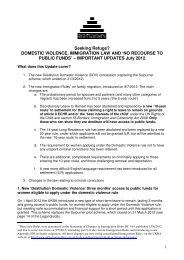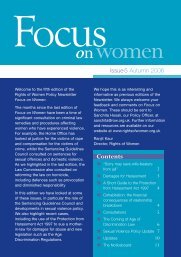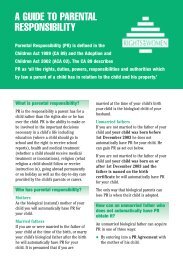Seeking Refuge? - Rights of Women
Seeking Refuge? - Rights of Women
Seeking Refuge? - Rights of Women
You also want an ePaper? Increase the reach of your titles
YUMPU automatically turns print PDFs into web optimized ePapers that Google loves.
grant you protection in the UK, you will have a new<br />
right to appeal against that decision. If, after<br />
making further representations to the UK Border<br />
Agency, you are refused protection in the UK, you<br />
do not have a new right <strong>of</strong> appeal against that<br />
decision. It may, however, be possible to challenge<br />
that decision by judicial review. This is a very<br />
complex area <strong>of</strong> law, so you will need to seek legal<br />
advice.<br />
What is new information?<br />
There is no limit on what counts as new<br />
information, other than that it must not have<br />
been considered before by the UK Border Agency<br />
or an Immigration Judge.<br />
The following are examples <strong>of</strong> what might count<br />
as new information. However, because there is no<br />
limit on what counts as new information, this list<br />
is not exhaustive. If you think you might have new<br />
information that could enable you to make a fresh<br />
claim, you should get legal advice from a solicitor<br />
or immigration advisor as soon as possible.<br />
Examples <strong>of</strong> new information:<br />
• Information that relates to you and your<br />
safety, should you have to return to your<br />
country. This might include:<br />
o information about a friend or family<br />
member who has been arrested or harmed;<br />
o new documentation, such as an arrest<br />
warrant or judgement against you;<br />
o information from an expert, in the form <strong>of</strong> a<br />
report on your physical or mental health;<br />
o a new threat to your safety, such as from a<br />
member <strong>of</strong> your family;<br />
o a change in your circumstances since your<br />
claim was decided, for example, if you have<br />
left your husband, or you have had a child.<br />
• Information about your country. This might<br />
include:<br />
o a change in who is in Government;<br />
o a change in the law;<br />
o the start <strong>of</strong> a war or a conflict; or,<br />
o the worsening <strong>of</strong> a conflict, or a conflict<br />
moving into an area that was previously<br />
safe.<br />
• A change in the law, including:<br />
o a new piece <strong>of</strong> legislation, such as a new Act<br />
<strong>of</strong> Parliament, Directive <strong>of</strong> the European<br />
Union or the coming into force <strong>of</strong> a new<br />
piece <strong>of</strong> international law (for example<br />
Council <strong>of</strong> Europe Convention on Action<br />
against Trafficking in Human Beings, which<br />
the UK Government ratified in 2008);<br />
o a change to the Immigration Rules;<br />
o a change in case law, for example, following<br />
a new decision from the European Court <strong>of</strong><br />
Human <strong>Rights</strong>, the House <strong>of</strong> Lords, Court <strong>of</strong><br />
Appeal or the Asylum and Immigration<br />
Tribunal.<br />
Example <strong>of</strong> a change in case law:<br />
RN (Returnees) Zimbabwe CG<br />
[2008] UKAIT 00083<br />
RN was a teacher in Zimbabwe who had<br />
claimed asylum in the UK the day after she<br />
arrived here. RN had not been involved in<br />
political activities, but she was a teacher and<br />
she claimed that she would be at risk if she<br />
was returned, as she would be assumed to be<br />
a supporter <strong>of</strong> the opposition Movement for<br />
Democratic Change (the MDC). RN was also<br />
concerned that she would face retribution<br />
from her former boyfriend, who had been<br />
violent towards her and her mother.<br />
RN’s case was refused and arrangements were<br />
made for her removal to Zimbabwe. RN<br />
appealed against this decision and, following a<br />
number <strong>of</strong> hearings, the Asylum and<br />
Immigration Tribunal (AIT) found that those at<br />
risk <strong>of</strong> persecution in Zimbabwe were not<br />
limited to those who actively supported the<br />
MDC, but also included anyone who could not<br />
demonstrate loyalty to Zanu-PF. Teachers, as a<br />
group, were also considered to be at risk<br />
because it was assumed that they were<br />
involved in political activities. Despite recent<br />
improvements in the political situation in<br />
Zimbabwe, the AIT found that the power<br />
sharing agreement had not removed the real<br />
risk <strong>of</strong> persecution or other serious harm to<br />
certain Zimbabweans.<br />
As a result <strong>of</strong> this decision, many<br />
Zimbabweans who have had previous claims<br />
for asylum refused may have fresh claims. You<br />
can read the judgement by looking here:<br />
www.ait.gov.uk/Public/Determination<br />
Details.aspx?Id=2184<br />
If you think your situation may be affected by<br />
this decision, you should seek legal advice.<br />
62
















